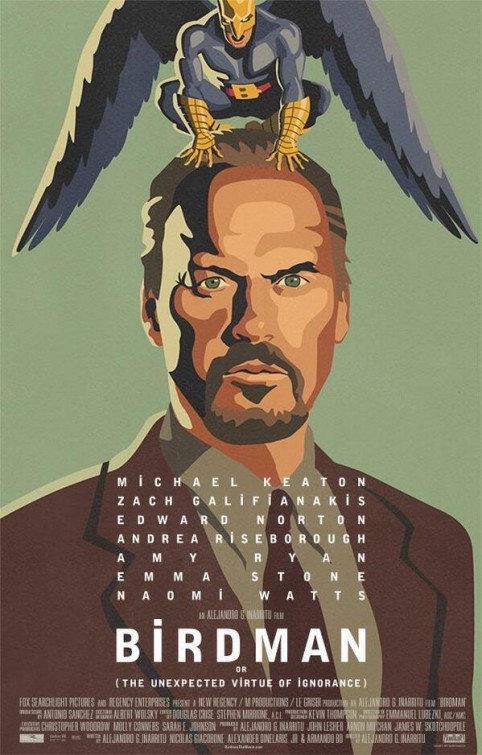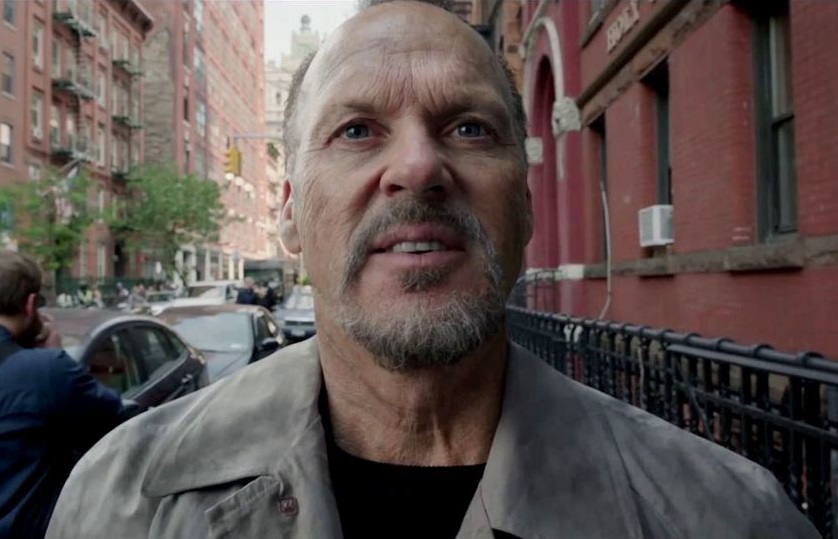 Birdman or (The Unexpected Virtue of Ignorance). Good vs Evil. Substance over Style. In-N-Out. Truth or Dare. Rise and Fall. Extant/Extinct. Fight or Flight.
Birdman or (The Unexpected Virtue of Ignorance). Good vs Evil. Substance over Style. In-N-Out. Truth or Dare. Rise and Fall. Extant/Extinct. Fight or Flight.
The universe started with binaries beginning with light encroaching against its absence. We grew up on dualities starting from me to you, from the collective troughs to individual peaks. As we approach our own ends, we mull over the past to make better use of the little time left, whether to enjoy life, or to wage one final war with death. In the grand scale of things, Birdman or (The Unexpected Virtue of Ignorance), which is how the film ought to be called, is a self-aware commentary (or a thesis) on the eternal everyman battle of being someone, capsuled in the world of Riggan Thomson, a washed-out movie tar of a fictional superhero franchise.
Beyond the dark themes, the film is a tragic journey of the former Birdman to become his own through a Broadway play he adapted, produced, directed and stars in. Possibly a caricature of his own celebrity, Michael Keaton outstandingly plays the protagonist through and out of the layers plastered by fans, the industry and by himself.
The introspective moments splendidly reveal Riggan’s demons and defenses, while internal setbacks and enemies pressure him to be greater, all in the search of recognition. It is in the means of pursuing these choices that matter and the movie triumphs in.
As his own underdog, Riggan must fight his way to bring to stage Richard Carver’s What We Talk About When We Talk About Love against the usual suspects of the overbearing and controlling thespian played with bravura by the charismatic Edward Norton; the typical financing hell; and a mean principled Tabitha, the critic of all theatre critics. In between these are the family-career diatribe, technological infusion in the ancient art and celebrity worship, and the nightmare of a world in praise of the blurred traditional private and intimate boundaries.
A good companion piece to Richard Linklater’s Boyhood, which is coincidentally this film’s major contender in the ongoing awards race, Birdman or (The Unexpected Virtue of Ignorance) is another purposeful character study beyond the walking, talking human character we see. Where the former is ambitious with its length of filmmaking and a higher level of freedom of its characters and its world, this film powerfully hits the right notes in the geriatric end of the spectrum of life and career. More than the words and heartfelt lines shouted by the acting ensemble directly or indirectly to Riggan, the visual cramp claustrophobic state and percussion-laden score adds to the primal psychological, or possibly psychiatric (meaning pathological or unwell) biopsy. It is a palatable mix well-conducted by its director Alejandro González Iñárritu, who also co-wrote and co-produced this excellence. Such hands-on nature of filmmaking reflecting multiple parallels within the film, the film’s play and the film’s lead’s own life, imbibes purpose in every chosen shot, crafted character and the seamless faux-one-take editing style. Surprisingly, even with these layers, it doesn’t become too alienating for one to need to hit the absent pause button. There are plenty of breathers, balconies and cerebral sidewalks for one to ruminate, with visual cues and self-explanatory sequences that keep you grounded but not forcing you to choose a singular perspective. Even if it is straightforward in delivering awe in the current stage of the outside world piercing inner sanctities, it is equally successful in being ambiguous with the concurrent tragedy of a bird’s escape from its corporeal cage, only ending in a bigger prison. Not all films get to be seen but this is one that deserves to be ruminated.
As life is a series of binaries that amount to complexities, let us examine the film with a closer look. This part is dedicated to readers who have already experienced the film, meaning they have watched it and given their own take of it. For those who still want to go on, don’t be outraged of the subsequent spoilers.
When does reality end and the dream begin? The telekinetic elements are explained to be more of make-believe when he is seen trashing the room by Jake, his producer. Birdman is noted to be all in his mind, as the magical realism sequence of him flying is later shown as him taking a cab to his destination after all. If the cab element is removed, everything after his jump from the rooftop might be the act of his true death, with everything thereafter being a part of wishful thinking or a consolation prize from the afterlife. The abnormal demeanor, his ex-wife’s black dress, the abundance of flowers, his form of lying in bed like a akin to a coffin, all contribute to how a funeral looks. Other than this, there are select visual markers, identified by the cuts, that may prompt as the firmament of death, separating life and the afterlife. The most obvious mark is right after the final gunshot scene. After an hour-and-a-half-long display without any hard cuts, we are rewarded with a number of less-straightforward symbolisms of sea birds descending to the dead remains of jellyfish washed on the shore; falling comets; the Times Square entertainers on Broadway stage; and different stagnant light sources. The hospital scene after feels subtly surreal with a rave review from Tabitha; the lack of concern on his state of mind; a reunited family; how the nose looks not as damaged from a close ranged gun shot; and an unlocked window that is against protocol for any smart hospital. If the suspension of disbelief still works, the final marker would be his window jump where Emma Stone’s facial expressions of shock, surprise and delight surely confused any viewer.
I believe that Riggan died before the film even formally started. The opening quote from Richard Craver is a conversation between the end-of-life exit interviewer and Riggan Thomson. As the title is typewritten on screen, a frame of a jellyfish washed on the sand is flashed for a split-second. This is a point of no return. Jellyfish out of seawater cannot be revived. Next is a short display of a falling burning comet. This is a possible reassurance of his demise. Everything that follows is in limbo, where Riggan is given one last chance to make something of his perceived worthlessness. Acting as different angels or demons of his bruised psyche, molded in similar vein as archetypes of people he interacted with are a trusted friend (Jake), the great love from a failed relationship (Sylvia), the current love/lust, a career opponent (Mike), the family (Sam), the multitude of generic fans and the singular entity of all that is not right in the world (the critic). Much of this interpretation stems from the seeming interplay of life and art. Sequences in Riggan’s play parallel with his life regarding his parasuicide and ex-wife, and even with the interactions earlier showed in the film. A possible counter-argument is the blurring of typical boundaries in the arts as one imparts a portion of oneself to the endeavor. Mike cannot be himself outside the stage so it may be logical to think that things that happened to Riggan, he placed in his adaptation, while some of the characters’ storyline wrap-ups are influenced by their own stage characters. This might be too much of a stretch and too convenient as the other markers of death are valid as well but what influenced this thought process is the drum score laden with street voices in both the opening and ending credits. Given the purposeful elements throughout the film, this score would not have been just some stylistic touch.
One thing for sure is the bird flew from the confines of man. The internal unrest has been calmed after all the external intrusions to his art and stature from through gross self-serving invasions and caricatures of who he is, from people who don’t even know him. What matters the most is what matters to him first: Riggan got the recognition he wanted from the one special person to him.
[youtube http://www.youtube.com/watch?v=uJfLoE6hanc?controls=0&showinfo=0]




